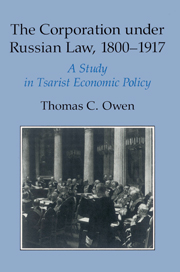Book contents
- Frontmatter
- Contents
- List of tables
- Preface
- Abbreviations
- The corporation under Russian law, 1800–1917
- 1 Zakon (The law), 1800–1856
- 2 Birzhevaia goriachka (Stock-exchange fever), 1856–1870
- 3 Proval reformy (The failure of reform), 1860–1874
- 4 Opeka (Tutelage), 1865–1890
- 5 Proizvol (Arbitrary acts), 1880–1905
- 6 Bezobrazie (Outrage), 1905–1914
- 7 Tupik (Dead end), 1914–1917
- 8 Autocracy, corporate law, and the dilemma of cultural delay
- Selected bibliography
- Index
- Studies of the Harriman Institute
8 - Autocracy, corporate law, and the dilemma of cultural delay
Published online by Cambridge University Press: 22 September 2009
- Frontmatter
- Contents
- List of tables
- Preface
- Abbreviations
- The corporation under Russian law, 1800–1917
- 1 Zakon (The law), 1800–1856
- 2 Birzhevaia goriachka (Stock-exchange fever), 1856–1870
- 3 Proval reformy (The failure of reform), 1860–1874
- 4 Opeka (Tutelage), 1865–1890
- 5 Proizvol (Arbitrary acts), 1880–1905
- 6 Bezobrazie (Outrage), 1905–1914
- 7 Tupik (Dead end), 1914–1917
- 8 Autocracy, corporate law, and the dilemma of cultural delay
- Selected bibliography
- Index
- Studies of the Harriman Institute
Summary
Someday the future historian of our era will note its curious feature: In small clashes over trifling issues he will discover the slow but relentless action of the powerful currents of history.
– Petr B. Struve (1897)The main theme of the history of Russian corporate law – the survival of the restrictive features of the legislation of 1836 into the era of railroads, steel mills, and electricity – provides an instructive reminder of the essential continuity of tsarist policy toward capitalist institutions. Created to protect investors from unscrupulous manipulators of corporate stock prices, the law of 1836 established a procedure for incorporation that placed the fate of each new company in the hands of the bureaucracy. Neither Reutern, Witte, nor Timashev abandoned this cumbersome device in favor of the registration system (iavochnaia sistema), which predominated in Europe, the United States, and even Japan by the end of the nineteenth century.
An equally important theme is that piecemeal changes in the law of 1836, such as the recognition of unnamed corporate shares by the 1860s and the legalization of futures deals in 1893, did not signify increased liberalization. The ministers of Alexander III and Nicholas II in fact imposed on corporate officials and employees ever greater restrictions – on residence, landownership, and economic activity – that had no foundations except premodern ethnic, religious, and national prejudices.
- Type
- Chapter
- Information
- The Corporation under Russian Law, 1800–1917A Study in Tsarist Economic Policy, pp. 198 - 219Publisher: Cambridge University PressPrint publication year: 1991



